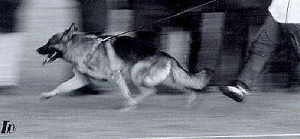Compelling and interesting documentation well put together about BSL - primary focus on Canada, but filled with stories and statistics on 33 pages in pdf.
"Breed Specific Legislation (BSL) is the systematic targeting of arbitrarily determined dog breeds. Often BSL is the knee-jerk reaction to media reports and incidents, which resulted in an injury or fatality cause by a specific dog breed. BSL does not attempt to correct the problem of bad owners, but rather it punishes all individuals who choose to own a breed, which has become targeted by ill informed legislators.
Throughout the 20th and 21st Centuries a variety of dog breeds have been targeted as vicious breeds and subject to legislation and targeted media reports. Several of the targeted breeds included the Doberman Pinscher, the German Shepherd, Saint Bernard and Rottweiler.
Any dog, which is known to be a threat to public health and safety should be properly restrained, confined, and, when warranted, destroyed. As dog bites are indicative of an individual dog’s nature or upbringing, to pre-determine that a particular breed is more susceptible to biting is a hard to substantiate claim.
As a result of a breed ban in France, individuals sought out a replacement for their watchdogs. Rather than choose another dog breed, they smuggled Barbary Apes into the country to act as watchdogs as the apes are extremely strong, have sharp teeth, and are very short tempered.
Breed-specific legislation has several weaknesses including vague identification standards as well as under and over inclusiveness. Breed specific legislation targets all dogs which may have the physical characteristics of the targeted breed. The use of a set of standards to eliminate a dog, which meets 50% of any standard, could result in non-banned dogs being subject to muzzles, isolation, destruction or abandonment by their owners. In several jurisdictions, it is the owner’s responsibility to identify the breed of their dog during licensing and routine veterinary examinations, which further complicates the identification process. The question then arises: which standards does a jurisdiction use – a physical attributes test, a behavioral test, the use of expert breeders to determine breed, or non-experts. Breed bans should not be used as a quick fix. The solution lies with effective animal control and enforcement, responsible owners, education programs, reputable breeders, and reliable data."
Read more
Read More...
Return to the Blog...


